In an unfortunate turn of events, I ended up with two final exams on Monday, August 15. (Of course, one of those exams was a drop-in lab, meaning I chose to have two final exams, but whatever.)
Because my transit home is just over an hour at best, I knew I would be staying on campus in between. After a friend cancelled on me, I–not being much of a crammer–brainstormed some plans of my own.
Taking transit every day to go to school means that there are a number of cool shops that I see on my way to the university that I never really have the time to visit. And now, of course, I did! So, once I got out of my first exam at 3pm, I decided to spend the next four-ish hours hopping the indie bookstores of the west side of Vancouver, from Alma to Cambie.
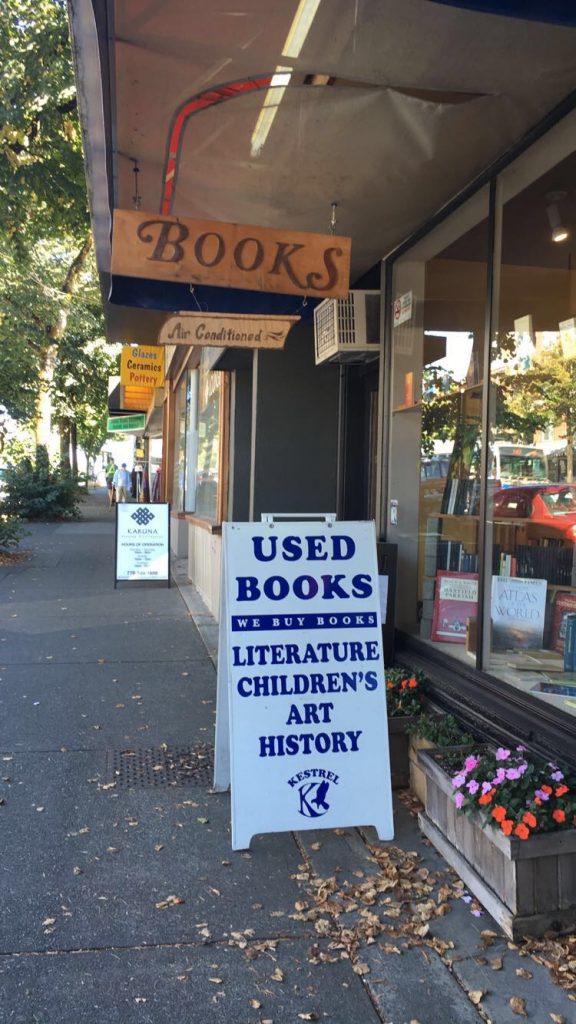
Kestrel Books on West 4th and Alma
My first stop was the only one on West 4th, which is the street my (preferred) bus rides down to get to campus. I’d seen Kestrel Books almost every day for the past two school years, so it was cool to finally go inside.
Kestrel was the smallest bookstore I visited that day, and it didn’t try too hard to be anything more than it could be. By that, I mean: there were stacks of books by the checkout table, but other than that, the store was neat and tidy and didn’t induce that feeling of claustrophobia that small used bookstores usually create. There were three main aisles, curling left into the back corner of the store.
The first aisle I went down, on the furthest right, contained fiction and poetry. It’s where I spent most of my time even after I ventured further in. I circled around the back and turned left (skipping the middle aisle), with a pleasant surprise at the end of the aisle.
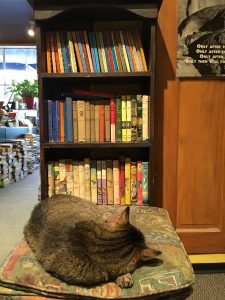
Guardian of the Children’s Books
Kitsilano has an awesome pet culture. They do love their animals.
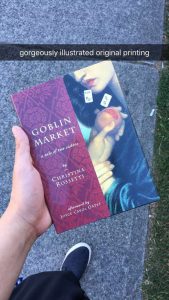
Goblin Market by Christina Rossetti
I deliberated between a copy of Shakespeare’s sonnets, Canadian poet E.J. Pratt’s Towards the Last Spike, and a beautiful collector’s library collection of Jane Austen’s novels (they were so small and beautifully bound!), but knowing that I wanted to visit other bookstores, I set a budget for $10 a bookstore and settled upon Goblin Market by Christina Rossetti, one of my favourite poems studied in my British literature course from last year.
Pleased, I walked down Alma from West 4th to West 10th, to White Dwarf Books, a fantasy & science fiction indie store. It was the only one I visited that day that I had already visited on a previous day.
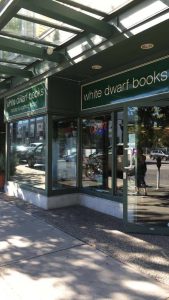
white dwarf books on West 10th and Alma
Unlike Kestrel, which was a used bookstore, white dwarf books sells mostly new books, so it is a well-organized and well-stocked store. When I went to Kestrel, there was a sign on the window proclaiming that it was air-conditioned. Although it was a hot day, I remembered finding this amusing (why advertise air-conditioning?). I did not find it amusing when I walked into white dwarf books, which is not air-conditioned.
Unfortunately, there was nothing that I really wanted under my $10 budget (I was looking for specific Terry Pratchett books, but in addition to not being the ones I was looking for, they were all new and so, over budget), so I walked out empty handed.
I hopped on the infamous 99 B-Line to visit two stores at the Macdonald stop. The first of these two was Vancouver’s self-described “legendary independent bookstore”.
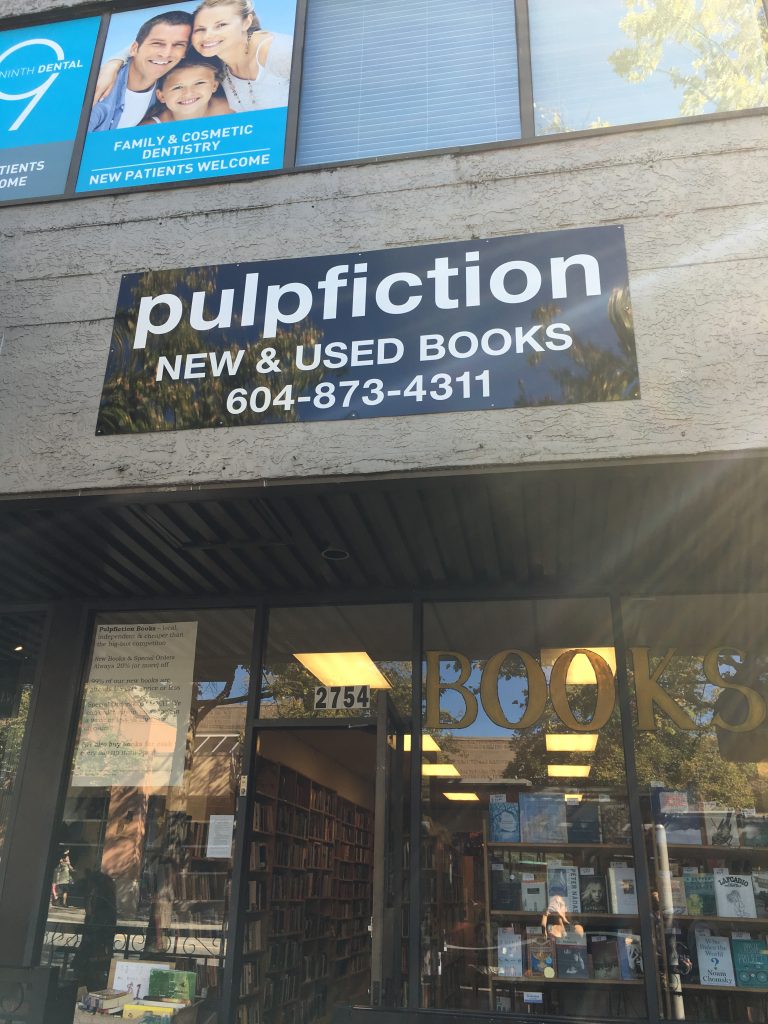
Pulpfiction Books on W Broadway and Macdonald
The first thing I saw in the bookstore was a poetry dispenser, which I thought was cute.
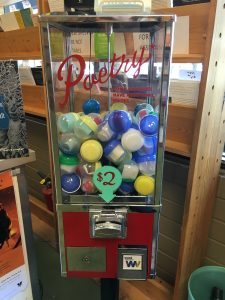
Poetry for a toonie
Neat, tidy, and spacious (qualities that one does not usually associate with independent bookstores that sell used), Pulpfiction did not have a great selection of unique bindings, which is what I’m mostly interested in right now, but I didn’t spend much time browsing, since I found what I wanted pretty much right away. (I love Virginia Woolf.)
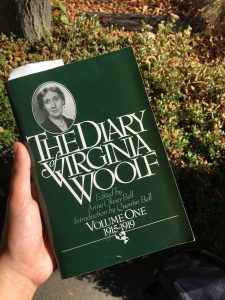
The Diary of Virginia Woolf
I walked further down West Broadway to the “largest and best children’s bookstore in Canada”.
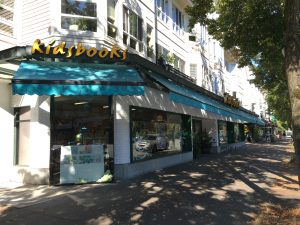
Kidsbooks on West Broadway and Trafalgar
It’s kind of hard to be part of the literary scene of Vancouver and not know about Kidsbooks. Despite this (and the fact that I, of course, saw it whenever I took the 99 B-Line), I had never actually visited the store, which had recently moved further down West Broadway from closer to campus.
Kidsbooks is kind of a really, really magical place. I hope it’s still around when I have kids. Well, more than that: I hope it’s all over Vancouver, all over Canada by that time! It’s fun packed from wall to wall. More than just on the shelves, there are fun seats, toys on tables, eye-catching decorations, and books books books! It was lovely.
While sitting in a corner doing some research (there was free wifi, too!), a shelf of books about countries around the world caught my eye. I flipped through one about my home country (the Philippines) and was delighted to see the representation; you have to go digging for things like this in big corporate bookstores, so to find it in Kidsbooks made me happy.
I chose to do some schoolbook shopping, and I found one of the books needed for one of my upcoming Honours seminars. Unabridged and including the original illustrations (as per my booklist):
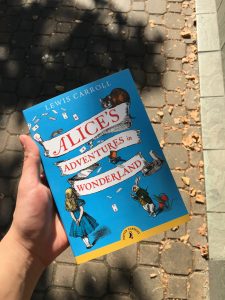
Alice’s Adventures in Wonderland by Lewis Carroll
The next bookstore, had I had more time, would have been Chapters, but I didn’t have the time, so I skipped the biggest bookstore in Canada and headed to “Vancouver’s local independent store since 1903”.
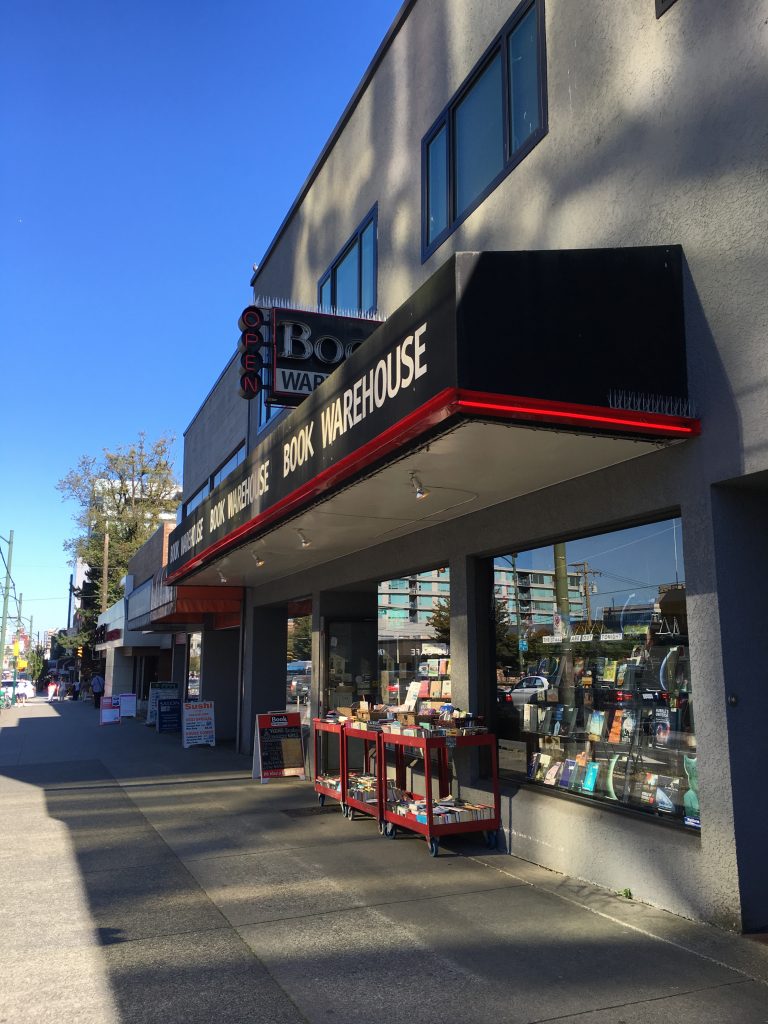
Book Warehouse on West Broadway and Ash
Book Warehouse, part of the Black Bond Books family, is like Kidsbooks in the way that it is independent but sells new (mostly). However, the store felt like a used bookstore in the distinctive way that the store organizes its sections.
After catching sight of Thomas King’s The Inconvenient Indian a few times (but not being able to buy it because it was over my $10 budget), I checked the fiction section for other King books in stock (and perhaps on sale). I loved studying Thomas King in Canadian and indigenous literatures last year, so I knew I would be happy with anything I found from him.
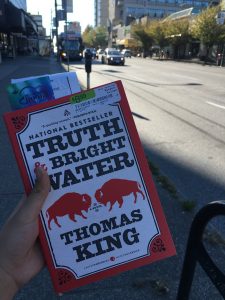
Truth & Bright Water by Thomas King
With the sun setting over West Broadway at 6pm and a final exam awaiting me back on campus, I jaywalked, popped into Michael’s for a peek at their stock, and then headed back to campus.
I was, truthfully, quite tired, and my backpack was noticeably heavier despite my purchases being quite small, but I was certainly glad to have gone on my little field trip, and I was happy to have supported Vancouver’s local bookstores, especially given that the Tri-Cities’ last used bookstore closed this summer.
On a visit to my professor’s house for a little party she threw, I commented that it must be so nice to have so many independent bookstores in her neighbourhood (in Kitsilano). She looked at me and smiled and told me it was nice to hear that, because she had been thinking that she had been noticing fewer and fewer independent bookstores.
Four or five independent bookstores is great, but it’s also, at the same time, not good enough. So let this be your friendly reminder to give your indie bookstores some love. 🙂













 A few months ago, one of my old coworkers invited her Facebook friends to visit the Jolly Olde Bookstore, which was closing in the summer, completely extinguishing the old, used bookstore species in the Tri-City area. People mourned in the comments, talking about how half their bookshelves were filled with books bought from this store, about how nice the owner was.
A few months ago, one of my old coworkers invited her Facebook friends to visit the Jolly Olde Bookstore, which was closing in the summer, completely extinguishing the old, used bookstore species in the Tri-City area. People mourned in the comments, talking about how half their bookshelves were filled with books bought from this store, about how nice the owner was.